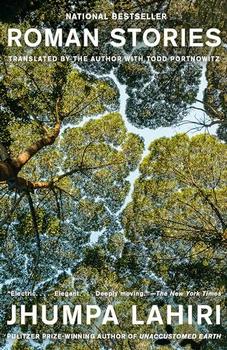Summary | Excerpt | Reviews | Beyond the book | Read-Alikes | Genres & Themes | Author Bio

The first short story collection by the Pulitzer Prize–winning author and master of the form since her number one New York Times best seller Unaccustomed Earth • Rome—metropolis and monument, suspended between past and future, multi-faceted and metaphysical—is the protagonist, not the setting, of these nine stories
In "The Boundary," one family vacations in the Roman countryside, though we see their lives through the eyes of the caretaker's daughter, who nurses a wound from her family's immigrant past. In "P's Parties," a Roman couple, now empty nesters, finds comfort and community with foreigners at their friend's yearly birthday gathering—until the husband crosses a line.
And in "The Steps," on a public staircase that connects two neighborhoods and the residents who climb up and down it, we see Italy's capital in all of its social and cultural variegations, filled with the tensions of a changing city: visibility and invisibility, random acts of aggression, the challenge of straddling worlds and cultures, and the meaning of home.
These are splendid, searching stories, written in Jhumpa Lahiri's adopted language of Italian and seamlessly translated by the author and by Knopf editor Todd Portnowitz. Stories steeped in the moods of Italian master Alberto Moravia and guided, in the concluding tale, by the ineluctable ghost of Dante Alighieri, whose words lead the protagonist toward a new way of life.
In sharing Lahiri's characters' thoughts, we can recognize parts of ourselves in them. At the same time, her use of rich details contributes to the scene, even when these details aren't the focus of her story. In "P's Parties," about a mostly imagined love triangle dreamed up by a husband at a friend's party, vacation plans and bungalows by the sea evoke a picture of summer and the tradition of Ferragosto, a holiday for which Italians debunk to the beach or the mountains, creating a lovely setting for a story about possible budding infidelity to unfold. It is through the ingenuity of setting and character development together that Lahiri builds a sense of place and the feeling of being in Rome...continued
Full Review
(589 words)
This review is available to non-members for a limited time. For full access,
become a member today.
(Reviewed by Pei Chen).
 Many of Jhumpa Lahiri's protagonists in Roman Stories, while not described as being of a specific ethnicity or nationality, are clearly foreign to Rome. So where might they be from? Italy's immigration statistics program only tracks non-EU newcomers to the country, giving an incomplete picture of immigration in general, but we can see that some of the top countries of origin of foreign residents in recent years include Albania, Morocco, Pakistan, India, and Bangladesh.
Many of Jhumpa Lahiri's protagonists in Roman Stories, while not described as being of a specific ethnicity or nationality, are clearly foreign to Rome. So where might they be from? Italy's immigration statistics program only tracks non-EU newcomers to the country, giving an incomplete picture of immigration in general, but we can see that some of the top countries of origin of foreign residents in recent years include Albania, Morocco, Pakistan, India, and Bangladesh.
While immigrant citizens, foreign residents, and visitors to Italy may have decided to live there for any number of reasons, a significant factor bringing new residents to the country has been the migration of asylum seekers from places experiencing wars, natural ...
This "beyond the book" feature is available to non-members for a limited time. Join today for full access.

If you liked Roman Stories, try these:

by Jo Piazza
Published 2025
From bestselling author and award-winning journalist Jo Piazza, comes a transporting novel rooted in the author's own family history about a long-awaited trip to Sicily, a disputed inheritance, and a family secret that some will kill to protect ...

by Anne Tyler
Published 2025
A new Anne Tyler novel destined to be an instant classic: a socially awkward mother of the bride navigates the days before and after her daughter's wedding.